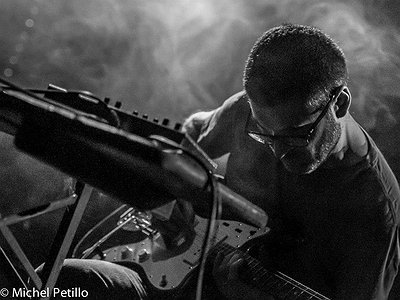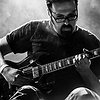Part 1
Name: Tropic of Coldness
Members: David Gutman, Giovanni La Placa
Nationality: American (David Gutman), Italian (Giovanni La Placa)
Occupation: Producers, sound artists
Current release: Tropic of Coldness's Human kindness is available from Whitelabrecs.
Recommendations:
David Gutman: Anish Kapoor: “Adam”
Giovanni La Placa: Aleksandar Hemon: “My Parents: An Introduction / This Does Not Belong to You”
If this Tropic of Coldness interview piqued your interest, visit their official website. They are also present on bandcamp and facebook.
When did you start writing/producing music - and what or who were your early passions and influences? What is about music and/or sound that drew you to it?
DG: My first recordings, luckily lost, date back to my teenage years, made on a 4 track TASCAM tape recorder. They were inspired by Nine Inch Nails’ Broken and The Downward Spiral. They were a mix of field recordings (done in my flat), movie samples and simple guitar strumming.
GLP: My first “serious” music passions started in the second half of the 80s: shoegaze and a lot of indie from the UK, USA as well as from Italy. I started writing lyrics and music on my guitar since the mid-90s, when I also discovered and fell in love with the post-rock scene. I was playing with my Italian four-piece at that time, we recorded a couple of demos and a self-released CD between 1998 and 2001.
For most artists, originality is first preceded by a phase of learning and, often, emulating others. What was this like for you? How would you describe your own development as an artist and the transition towards your own voice? What is the relationship between copying, learning and your own creativity?
DG: Personally, the creative aspect of music has always been my ultimate aim when approaching any instrument. Therefore, I have never been interested in and totally skipped the “covers” period in my teenage. I can still see the face of my dad when I tried to explain to him that I had no time to waste in playing covers, the rockstar clock was ticking and there was no time to lose. I’m fundamentally a metalhead who with age went so extreme to evolve into silence and space. If I have to list the cover tunes I’m able to play these will be not many, few Metallica riffs and a couple of Hendrix songs.
GLP: Like David, I totally skipped the cover phase. When I started writing music I was definitely inspired by the US post-rock and post-hardcore scene of the 90s. Maybe we weren’t that original at that time. Through the years, we moved towards a more abstract and improvised style. When we started Tropic of Coldness the journey to the ambient territory was complete. I think that even if we didn’t invent anything we developed our own voice, we do our own thing. Still, I can’t deny that we might be subconsciously influenced by artists we admire.
What were your main compositional- and production-challenges in the beginning and how have they changed over time?
GLP: In my early years we were a band (2 guitars, bass and drums) and the main production challenges were related to the fact that recording wasn’t as cheap and easy as it is today. You had fewer possibilities to fix things if you were not satisfied, so you could record only when songs were really ready. Today we have complete freedom: we record, edit and mix whenever we want, how many times we want, until we are satisfied with the final result.
DG: As said I started on a 4 track and my struggles related to achieving meaningful sounds. I lost money and time just chasing the technologies and techniques to capture and manipulate sounds. Nowadays the situation is ironically the opposite: too many choices and I struggle not to be distracted by new temptations.
What was your first studio like? How and for what reasons has your set-up evolved over the years and what are currently some of the most important pieces of gear for you?
DG: Today as in the beginning, my studio is based on two main tools that over the years got closer and closer, becoming nowadays basically symbiotic and osmotic: the laptop (the brain) and the guitar (the heart).
GLP: Instruments, effect pedals, audio interface, laptop, mixer. That’s all.
How do you make use of technology? In terms of the feedback mechanism between technology and creativity, what do humans excel at, what do machines excel at?
DG/GLP: “What do I want to achieve?” This is the tricky question we force ourselves to remember, together with the answer to it, which cannot always be the same, but depends on the specific technology, tool or software. The opportunities offered by modern technologies are limitless and it is quite easy to get lost. We need to keep in mind that we are the drivers and the machines the tools, therefore it is mandatory to have a clear vision to avoid being dominated.
A general practice when buying a new “toy” is to immediately delete all the factory presets: the instrument discovery has to happen with our rules and questionings.
Production tools, from instruments to complex software environments, contribute to the compositional process. How does this manifest itself in your work? Can you describe the co-authorship between yourself and your tools?
DG: There is no co-authorship. The machines are my slaves and I try to be the worst dictator ever.
GLP: I am less tech-savvy than David, so my attitude towards technology has to be humbler. It’s a democracy, and as in all democracies not always my motion gets approved.
Collaborations can take on many forms. What role do they play in your approach and what are your preferred ways of engaging with other creatives through, for example, file sharing, jamming or just talking about ideas?
DG: As Tropic of Coldness I must admit we never allowed any external sonic contamination apart from a cello part played on the last track of “Maps of reason”. It happened because we felt we needed that specific sound and melody rather than for the sake of enjoying a musical conversation. It might be an unconscious overprotective attitude to preserve the “magic”, the alchemy between us, but actually we never felt the need of it so far. Few times we discussed about some opportunities that we left unexplored so far.
On the other hand, on my personal projects, I’m quite often interacting with other musicians and for sure the technology is the facilitator of such. Actually I never sat in the same room with my counterparts but always worked remotely exchanging files and sharing opinions.
GLP: For me collaboration is quintessential in order to achieve something meaningful in music, to the point that I never felt the need for a solo project so far. With Tropic of Coldness we found an almost perfect balance between the different elements: talking about concepts and ideas (how we want to record and arrange our compositions), jamming, file sharing (sometimes we share melodies and sounds, the embryos of our works) and mixing and editing.
Could you take us through a day in your life, from a possible morning routine through to your work? Do you have a fixed schedule? How do music and other aspects of your life feed back into each other - do you separate them or instead try to make them blend seamlessly?
DG: During the day I’m a mechanical engineer and I have a job that keeps me busy and drains a lot of attention. Nevertheless, I still use my musical projects as mental escapes. During working hours, I tend to plan, define a strategy or think an aesthetics vision I want to pursue. Once the day is over then usually I spend my time in translating my ideas into action, for example setting up new sounds, recording, pr, fine tuning some prep researches or just wandering around with my small universe.
GLP: I have a regular day job too, so I can dedicate to music only evenings and weekends. My routine is similar to David’s: I try to develop ideas for new compositions or arrangements or work on editing/mixing, depending on the stage we are in the recording process.






